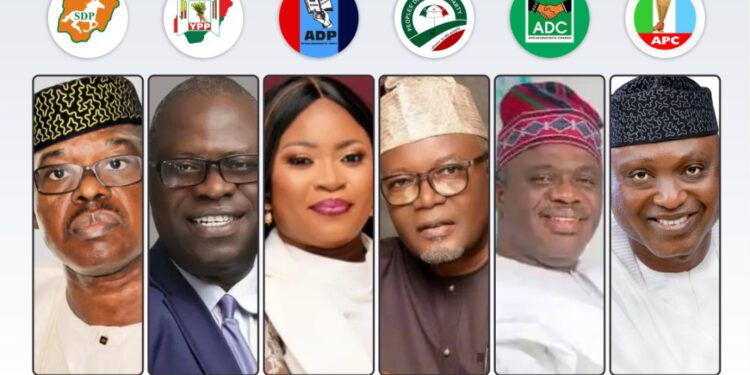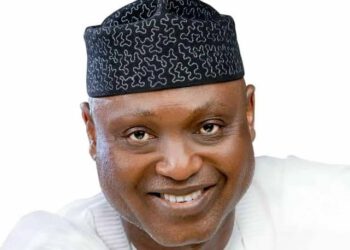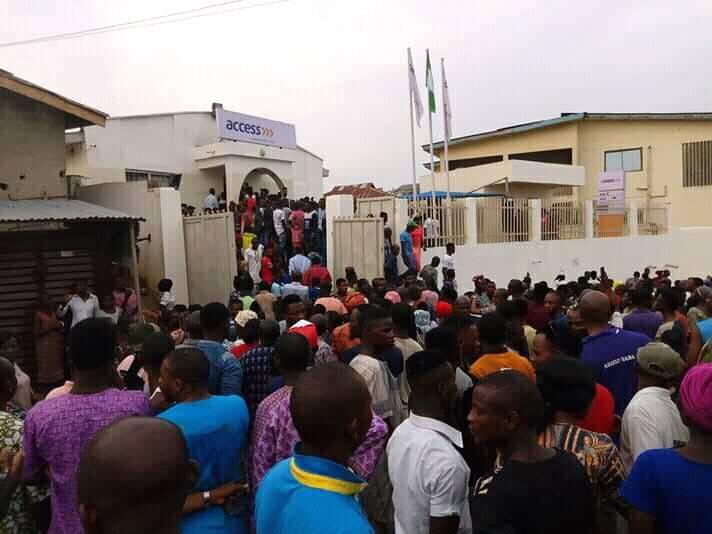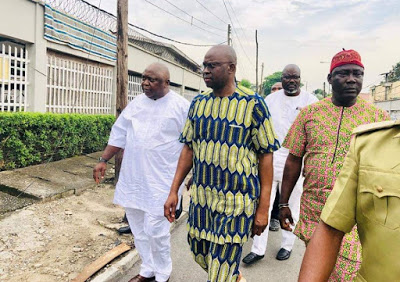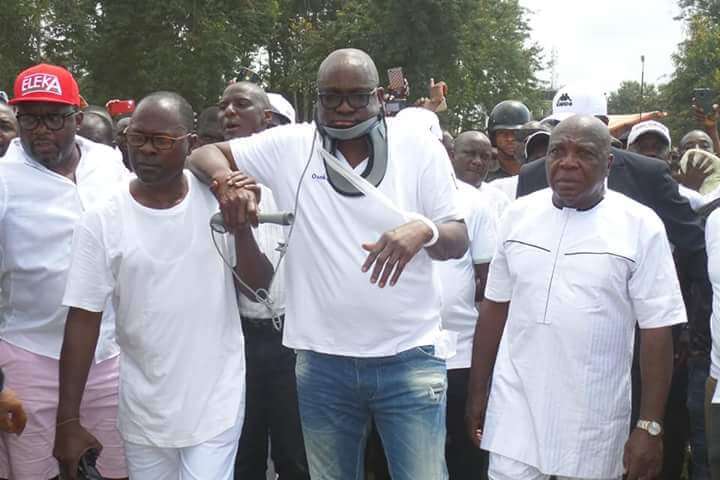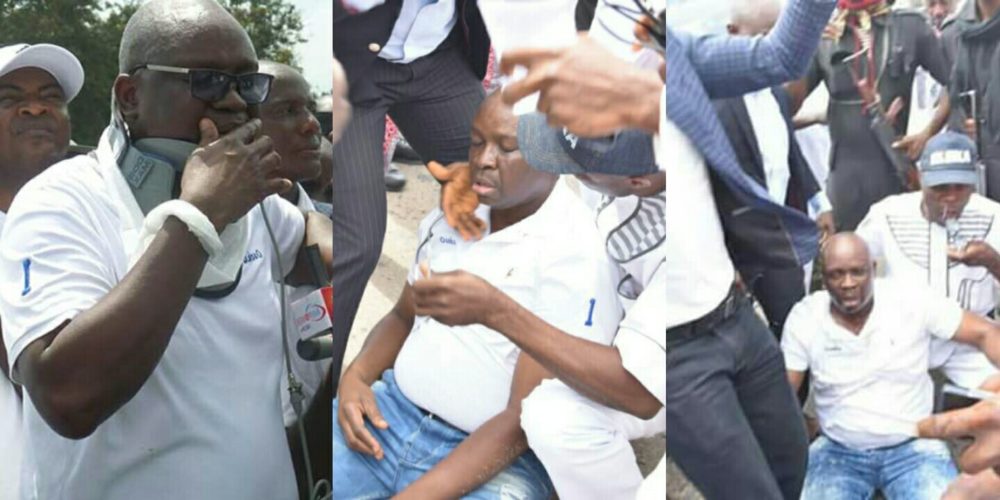Today is important in the life of Ekiti State. Voters are expected to troop out from 16 pre-existing local government areas to elect a successor to Dr. John Kayode Folorunso Fayemi (JKF), who is completing his second term in October. Who will be the winner?
Sixteen political parties are fielding candidates for the election. However, three of them – All Progressives Congress (APC), Peoples Democratic Party (PDP) and Social Democratic Party (SDP) – stand out. All eyes are on their candidates – Abiodun Oyebanji, Bisi Kolawole and Segun Oni – today.
The remaining 13 smaller parties also parade candidates with big credentials. But their structures are not formidable. In fact, it could be said that SDP and other 13 parties evolved, more or less, from the APC and PDP. Their members regrouped as a reaction to the outcome of nomination politics in the ruling and major opposition parties.
That factor may have accounted for the bitter rivalry, strife and rancour, as well as violence that have characterised the campaigns. They are unnecessary.
How has Ekiti fared in modern Nigeria? Its journey to the present time has been long, tortuous and challenging.
In Yoruba land, Ekiti is a sub-tribe reputed largely for its homogeneity. It is also the most united bloc within the race, although that unity and harmony are now being disrupted by politics and the periodic contest for the Government House in Ado-Ekiti.
Mud houses in majority of the 120 towns and villages appear to be giving way to new structures now. But in those ancient buildings, professors and other seasoned professionals -lawyers, doctors, pharmacists, architects, teachers, among others, were weaned for humanity.
Like other neighbouring kith and kin – Ijesa, Akoko, Igbomina, Ife and Oyo – agriculture was the people’s main occupation. It produced a population of subsistent farmers.
Their progenitors laid claim to Ife ascendancy. But Ekiti appears different in many respects as well.
In Ekiti land, there is no single paramount ruler, like the Alake of Egba land, Awujale of Ijebu land, Owa Obokun Adimula of Ijesa land and Alaafin of Oyo. Nearly all the towns and villages are independent of each other.
That republican disposition motivated Ekiti to reject an attempt by the colonial masters to impose the Oore of Otun on Ekiti as the paramount ruler. Ekiti also resisted an attempt to lump his territory, Moba land, with the North by the British. Akure, Ilaramokin, Isarun, Iju, and Ita-Igbolu were Ekiti towns at that time.
Instead, Ekiti monarchs and chiefs resolved to evolve a collegiate leadership. Ekiti became a confederation. Up came ‘Pelupelu,’ the apex traditional leadership cadre, which largely performed ceremonial and advisory roles. In their meetings, matters of welfare were addressed. Quarrels, especially boundary disputes, were resolved. There was brotherhood. An atmosphere of peace and tranquility largely pervaded. It attracted the respect of neighbours.
But before 1877, the confederation faced a threat. Many Ekiti towns that shared boundaries with Ijesa naturally deferred to Owa Obokun Adimula. Indeed, the Owas of yore perceived Ekiti as an inferior sub-race.
In Ekiti, reference is made to an old Almanac depicting Owa as a big cat and other monarchs from Ijesa and Ekiti as mice. That characterisation was infuriating to many Ekiti monarchs who had to severe relations with the Ijesa paramount ruler.
Indeed, other sub-tribes close to the lagoon -Isale Eko, Ijebu, Egba, Awori and even Egun -perceived Ekiti as the hinterland (ara ilu oke). To them, ‘Ekiti Kete’ was a bush cut off from civilisation. Ekiti traders, men and women, who thronged Ejirin market in those hey days had to pay tribute (isakole) to Ijebu rulers before being allowed to pass through their territory.
Those Ekiti people who also came to Lagos to buy salt, a scarce and precious commodity then, had similar experience.
Later, a greater threat came. From the ashes of the fading Oyo Empire rose the Ibadan State. It was a free settlement for strongmen from Oyo, Iwo, Iseyin, Ejigbo and neighbouring towns. Their power grew to the zenith. Ekiti became their prey. For years, the servants of Baale of Ibadan (Ajele) ruled and oppressed some Ekiti towns and villages.
As native colonial administrators, they collected tributes for Ibadan chiefs. They were reckless in their dealings. They forcefully took over the wives of the indigenes, seized their agricultural produce, impounded their property and subjected them to harsh punishment for daring to raise eyebrows.
The last straw that broke the back of the camel were the excesses of the Ajele of Okemesi-Ekiti. He had turned himself into a thin god. Since he was lord to himself, he had no respect for any other indigene.
That Ajele later transgressed. He violated the wife of Fabunmi, a prince and a warrior. When he was confronted by the husband, who was also a soldier who had sojourned in Ibadan, he asked him to do his worst. Fabunmi, a brave prince, beheaded the Ajele. A war broke out between Ekiti and Ibadan.
Since the goal was freedom, Ekiti never ran away from battle. They confronted the odds. Tired of oppression by the Ajeles, they fought for 16 years to free themselves from the yoke of Ibadan. After each town fought on its own, the drum of unity sounded in 1877.
Fabunmi sent messages to all monarchs, leaders and warriors in Ekiti. There was uproar. In almost all the towns, young men either killed or drove the Ajeles away. The young men later organised themselves into a troop to join Fabunmi and an army of 50,000 men was created.
From all over Ekiti, farmers sent yams, beans and other food items to the new army. Women cooked and took food to the warriors. An organisation was formed and given the name of Ekiti Parapo. Ekiti kings collected special levies and sent the money to the army for the purchase of gun powder from European traders in Lagos and Benin Port.
To maximise their strengths, the leaders of Ekiti Parapo sent to the rulers of Ijesa, Igbomina, Akoko and invited them to support them during the Kiriji War. They agreed and sent troops and leading Generals. Till 1893, Ekiti Parapo did not surrender until the peace terms brokered by the British Government were strictly adhered to.
Notable among the warriors were: Ogedengbe Agbogungboro from Ijesa, Fabunmi, the initiator, Faboro of Ido, Fajembola, Aduloju, who supplied arms, Josunosimi, Agada and Okirikiribata.
The Ajero Asotemoru of Ijero and Arinjale of Ise encamped at Imesi-Ile to boost the morale of Ekiti soldiers.
In post-war period, Ekiti prepared for the journey for modernity. The agents of change were the prisoners of war who were sold into slavery in distant Yoruba towns. There, some of them learnt how to read and write. When slavery was abolished, they returned home.
They went into slavery without anything; they came back with Christianity. They pioneered the early Anglican, Methodist, Baptist and Catholic missions in Ekiti. The religious horizon expanded with the crusade of 1930 by the Christ Apostolic Church (CAC) Evangelist Ayodele Babalola.
The missionaries laid the foundation of civilisation in Ekiti. The rural enclave knew that knowledge was power. When, in later years, the late Chief Obafemi Awolowo became the Premier of Western Region, the people of Ekiti, who remained a bloc in the old Ondo Province, embraced fully his free education programme.
In 21st Century Ekiti, there is no household with out, at least, five graduates. An average Ekiti is intelligent, strong-willed, daring and principled. But what Ekiti values most is character, which, in local dialect, is called omoluabi. In recent times, the attribute has been eroded by politics.
In 1960, the whole of Ekiti was one mega district council. The chairman was Samuel Aluko, later Professor of Economics.
Ekiti contributed to the success of the Awolowo administration. “Freedom For All, Life More Abundant”, the slogan of the defunct Action Group (AG), was captivating to the generality of the people.
Prominent Ekiti who worked closely with Awo were the late Chief E. A. Babalola (First Public Works Minister), Chief Ehinafe Babatola (his parliamentary secretary), the late Longe (a permanent secretary), Chief Oduola Osuntokun (Finance Minister), Chief Ayo Fasanmi (President of AG Youth Association), Chief Olawumi Falodun, Senator Banji Akintoye (professor of History), Chief Richard Babalola, and Chief Akin Omoboriowo. Not all of them stood by him to the end.
When the military sacked the legitimate government in 1966, the lot to steer the affairs of Western State fell on Col. Adekunle Fajuyi, an Ekiti from Ado. A detribalised Nigerian, the gallant officer made a big sacrifice for Nigeria. In a bid to save the life of the visiting Head of State, Major General Thomas Aguiyi-Ironsi, the host (Fajuyi) was murdered along with his guest. The mantle fell on another Ekiti officer, Col. Adeyinka Adebayo.
When Ondo State was created in 1976, Ekiti became the most populous and closely knit sub-ethnic group in the state. In 1979, the Unity Party of Nigeria (UPN), led by Awo, was their favourite party. Ekiti voted for Chief Adekunle Ajasin, who became governor.
But from 1980, Ekiti leaders – Omoboriowo, Babatola, Fasanmi, Prof. Opeyemi Ola, Lawrence Agunbiade, Adebayo Jeje and Samuel Babalola – started complaining about the marginalisation of Ekiti in the old Ondo State. That was the baseline for the agitation for the creation of Ekiti State.
Ajasin supported the struggle.
During the rivalry between Ajasin and his estranged deputy, Omoboriowo, Ekiti supported their son against the man from Owo. But when Omoboriowo deserted Awolowo by defecting to the notorious National Party of Nigeria (NPN), Ekiti withdrew its backing. Once Ekiti placed their hands on the progressive plough, there was no looking back.
After the Second Republic, Ekiti started to mobilise for state creation. A committee, headed by Chief Deji Fasua, was set up; Oyebanji was its secretary. The dream was realised in 1996. But the take-off grant is still hanging.
In 1999, Ekiti voted for the Alliance for Democracy (AD) candidate, Otunba Niyi Adebayo. It was in line with the time-tested tradition of installing progressive governments in power.
But the beat did not go on. The 2003 political earthquake swept through Ekiti. Poll-confident Ekiti was rattled by the outcome of the election. But Adebayo never challenged it in court. Since then, progressive and conservative forces have been alternating governance in Ekti.
PDP Governor Ayodele Fayose, who took over from Adebayo, did not end his tenure on a peaceful note. Fayose was shoved aside illegally in a hurriedly arranged impeachment. It was the first time in Nigeria that a governor and his deputy were jointly sacked.
A state of emergency was declared by former President Olusegun Obasanjo. Up came Administrator Idowu Olusi, who was foisted on Ekiti.
In 2007, Ekiti sunk into chaos. The election of that year became a war between the Action Congress (AC) and the PDP. The electoral agency declared Segun Oni of PDP winner. Fayemi of AC cried foul. He drew the battle line. The battle shifted from the ballot box to the court. The mandate was restored to Fayemi at the Appeal Court.
Four years later, Fayose bounced back. But he could not hand over to another PDP governor. Fayemi came back for a second term.
The die is cast again today. Unlike the previous polls, it is a three-horse race. Ekiti elders, who have called for decorum, believe that the poll should be a festival of choice.
Zoning is not an issue. Ekiti is one indivisible zone. Oyebanji is from Ikogosi in Ekiti Central District. Also, Kokawole, who hails from Efon-Alaaye, is from Ekiti Central. Oni, a native of Ifaki, is from Ekiti North District.
The three candidates are educated. They are men of experience and impeccable character. They are known to one another.
Their manifestos are not significantly different. The common themes are the defence of education, health, infrastructural development, workers’ welfare, agricultural development, creation of a conducive atmosphere for investment and industrialisation, payment of pensions, and security, which they cannot adequately provide unless there is devolution of powers or decentralisation of security apparatus. The similarity in manifestos or plans, notwithstanding, implementation approaches tend to differ a little.
The three frontline candidates know that if they assume the reins, they will face financial constraints amid greater expectations about performance. They are also conscious of the fact that governance cannot be a tea party in Ekiti.
Oyebanji is a former university teacher. He is a former Chief of Staff, Commissioner and Secretary to State Government (SSG).
He has a deep knowledge of Ekiti. He is armed with the vision of the founding fathers. He has an advantage of a ruling party wielding an incumbency power, a formidable structure with tap roots across the state. It seems Ekiti APC has closed ranks, following the election of Asiwaju Bola Tinubu as the party’s presidential candidate.
Oyebanji is the youngest of the three. He is a candidate of digital age. His party wants to use the success of Ekiti and Osun polls as a stepping stone to 2023.
Kolawole is a grassroots man, held in esteem in the PDP. He is popular, bold and brave. He has served as a supervisory councillor, commissioner, and party chairman. The exercise is important to the PDP in its calculation to firmly enlarge its coast in the Southwest ahead of next year’s election.
Oni is a former governor. He has experience and fanatical followership, particularly defectors from PDP and APC.
Many people love him as a gentleman who cannot hurt a fly. He wants to erase the past indignity of being judicially booted out of power. He believes he has an unfinished business in the Government House. To the people, he did his best when he was in the saddle.
Outside the three, other contenders on the platform of mushroom parties are merely warming the register of the Independent National Electoral Commission (INEC). They will be chief spectators on Election Day.
It is gratifying that the political leaders have promised to ensure peace before, during and after the poll. Thuggery should be old-fashioned. Violence should be outdated. An inconclusive election does not befit Ekiti.
The people look forward to a time that election results will be declared by INEC and there will be no post-election litigation.
Election is a collective responsibility. The success of today’s exercise depends on all stakeholders – the candidates, their supporters, party leaders, the electoral agency, security agency and the electorate.


